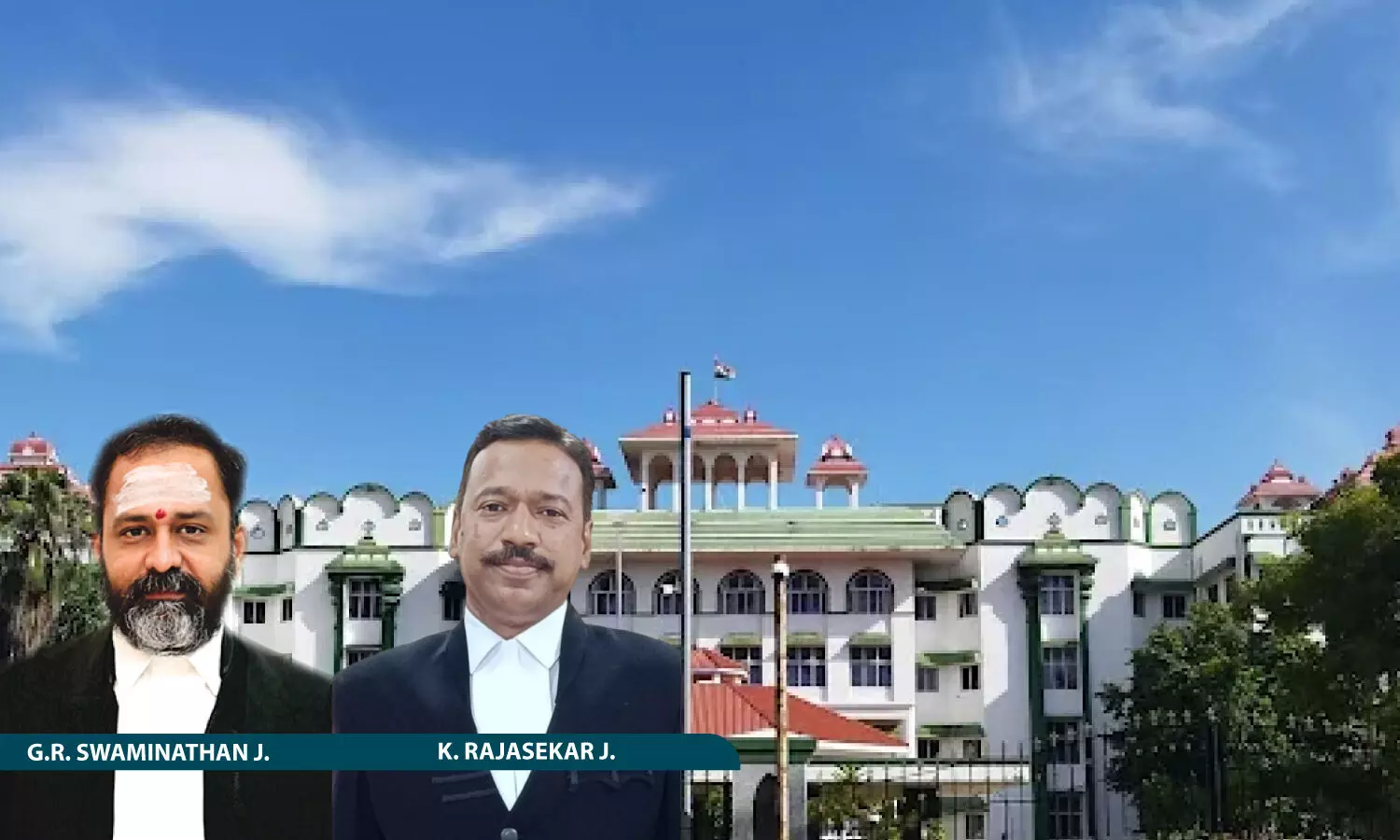
Justice G.R. Swaminathan, Justice K. Rajasekar, Madras High Court
Concept Of Reasonable Accommodation Has To Be Extended While Implementing Affirmative Action Programs: Madras High Court
 |
|The writ appeal before the Madras High Court was filed by the Director of Bharathidasan Institute of Management against the order passed in Professor’s favor.
While ordering the reinstatement of an Assistant Professor belonging to a Scheduled Caste, the Madras High Court observed that the concept of reasonable accommodation has to be extended while implementing affirmative programs to achieve substantive justice.
The writ appeal before the High Court was filed by the Director of Bharathidasan Institute of Management against the order passed in the Professor’s favour.
The DIvision Bench of Justice G.R.Swaminathan and Justice K. Rajasekar said, “Thanks to the constitutional focus on social justice, the soul of the suppressed communities is beginning to find utterance (to borrow from Shri Jawaharlal Nehru's “A Tryst With Destiny”). We would remind those in management to be more sensitive while assessing the performance of those who hail from the oppressed sections. Otherwise, those under the scanner would feel tyrannized in the name of merit (To borrow from the title of Micheal J.Sandel's book). The concept of reasonable accommodation which hitherto is associated only with disability law has to be extended while implementing affirmative programmes. Only then, substantive justice can be achieved.”
Senior Counsel P.H. Aravind Pandian represented the Petitioner, while Advocate Murugesh Ramiah represented the Respondent.
Factual Background
The writ petitioner belongs to a Scheduled Caste and is a holder of B.E. Mechanical degree from the National Institute of Technology. When the appellant institution called for applications from eligible candidates for the post of Assistant Professor in December 2020, the writ petitioner applied in response thereto. The first appellant offered the writ petitioner the faculty position of Assistant Professor. The writ petitioner accepted the offer and joined duty. His appointment was to be confirmed only on satisfactory completion of probation. His probation, however, was not declared, and his appointment was not confirmed. He was relieved permanently from his position.
Instead of giving one month's notice pay, three months' salary was credited to his account. The writ petitioner received two sets of communication terminating him from service. The writ petitioner filed a petition challenging the termination order and seeking reinstatement with consequential benefits. The Single Judge concluded that the writ petition was maintainable and the management had passed a stigmatic order without complying with the principles of natural justice. The Judge also quashed the impugned order of termination and remanded the matter back to the Chairman of Bharathidasan Institute of Management. Aggrieved thereby, the management approached the High Court.
Reasoning
The Bench took note of the fact that the writ petitioner belongs to a Scheduled Caste and has specifically alleged caste discrimination on the part of the first appellant. He had taken up the matter even up to the National Commission for Scheduled Castes. The Single Judge had negated the same on the ground that the same had been pleaded only as an afterthought in the reply affidavit. The Bench was of the view that if the writ petitioner fell short, the persons at the helm of affairs ought to have called him for counselling and motivated him. “Such a sensitive approach does not appear to have been adopted in the instant case. That has probably embittered the writ petitioner all the more”, it noted.
The High Court also did not endorse the stand of the Single Judge that the Director did not have the jurisdiction to terminate a probationer. When the appointment order had been issued by the Director, there was no reason why a termination order could not also be issued by him. Reference was made to the judgment in St. Mary's Educational Society Vs. Rajendra Prasad Bhargava (2023), wherein it was held that a writ petition against an employer having the status of “State” within the expansive definition under Article 12 will be maintainable.
The Bench thus held that the writ petition was maintainable while also observing that the fundamental rights of the writ petitioner had been seriously breached. Referring to the termination order, the Bench noticed that the expressions used therein were per se stigmatic. “...the termination order has to read as termination simpliciter. It should not appear to be punitive or stigmatic. If the order is punitive or stigmatic, then, the management has to comply with the principles of natural justice”, it affirmed.
The Bench also stated, “If the appellant had passed an order of termination simpliciter without stigmatizing the writ petitioner in any way, we would have unhesitatingly held that the remedy of the aggrieved employee is not before the Writ Court but elsewhere. But by calling the writ petitioner names, the management had seriously violated two fundamental rights of the writ petitioner ie., his right to reputation and his right to livelihood.”
“Even assuming that BIM is not a State or State instrumentality within Article 12 of the Constitution, still Writ can be issued against BIM since it had violated the writ petitioner's fundamental right under Article 21 of the Constitution”, the Bench said while dismissing the Writ Appeal. The Bench also ordered that the petitioner be reinstated with all the benefits.
Cause Title: The Director v. Dr. C. N.S. Ramnath Babu (Case No.: W.A.(MD)No.2107 of 2023)
Appearance
Appellant: Senior Counsel P.H. Aravind Pandian, Advocate Vikram Veerasamy
Respondent: Advocates Murugesh Ramiah, V. R. Shanmuganathan